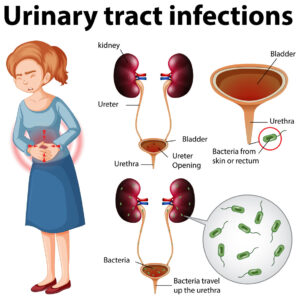A urinary tract infection (UTI) is a typical problem that many people face in urological health. In addition to being uncomfortable, these infections may worsen if treatment is not received. Dr. Krishna Daram aims to offer insightful information on preventive measures by elucidating the many causes of urinary tract infections.
1. Bacterial Overtake
The majority of UTIs are primarily caused by bacterial invasion. The kidneys, bladder, ureters, and urethra together make up the urinary system, which is typically sterile. However, germs can enter the urinary system and cause an illness.
Typically, these bacteria are Escherichia coli (E. coli). Inadequate personal cleanliness might raise the possibility of bacterial infiltration, particularly after using the toilet.
2. Immune System Weakness
The immune system is the body’s line of defense against pathogens. The risk of getting a UTI rises when conditions like chronic disease or certain drugs weaken the immune system. Dr. Daram highlights the need to preserve general health to bolster the body’s defense mechanisms.

3. Blockages in the Urinary Tract:
The regular flow of urine might be hindered by any impediment or blockage inside the urinary system. The conditions that are optimal for bacterial growth and infection are produced by this standstill. Urinary tract blockages can be caused by conditions like kidney stones or an enlarged prostate, necessitating quick medical attention.
4. Intimate Relations:
Sexual activity can cause urinary tract infections (UTIs) in certain people, especially women. The physical act of sexual intercourse raises the risk of infection by introducing germs into the urethra. To reduce this risk, Dr. Daram suggests maintaining proper cleanliness and drinking enough of water.
5. Diabetes
An increased vulnerability to infections is only one of the many consequences that uncontrolled diabetes may have on the body. Bacteria flourish in an environment when blood sugar levels are elevated. To lower their risk of UTIs, diabetics must successfully manage their health.
6. Catheter Use
Urinary catheters may be necessary for some people under specific medical circumstances. Although they are instrumental, catheters carry the danger of contaminating the urinary system with germs. To prevent infections, Dr. Daram suggests frequent monitoring and careful handling of catheters.
7. Menopause
Hormonal fluctuations may cause postmenopausal women to have alterations in the lining of their urinary system. They may become more prone to UTIs as a result. To address the particular requirements of postmenopausal women, Dr. Daram promotes routine checkups and customized therapies.
It is essential to comprehend the many causes of UTIs to effectively avoid and treat them. The importance of embracing healthy living habits, upholding proper cleanliness, and promptly seeking medical assistance when necessary is stressed by Dr. Krishna Daram. People can take proactive measures to improve their urinary tract health and general well-being by addressing the underlying problems.

